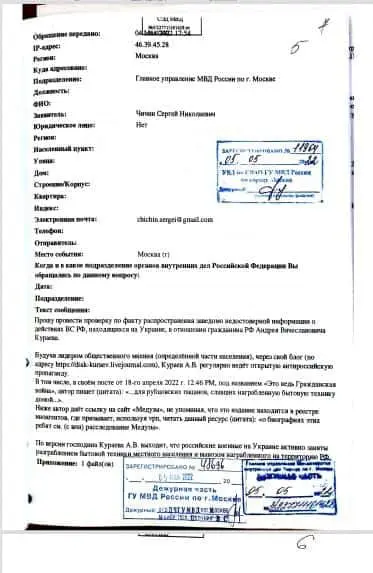The famous missionary and theologian Deacon Andrey Kuraev was convicted on 23 August 24, 2022 in the Nikulin District Court in Moscow on a denunciation filed “by the citizen Sergey Chichin” for his anti-war publications.
All requests of his lawyer were rejected and Deacon Andrey Kuraev was sentenced to pay a fine of 30,000 rubles for “discrediting the Russian army”. A second such trial against him threatens him with a real prison sentence.
“I don’t know what the court considered a crime in my article. The reasoned part of the judgment was not read. There are also no specific words or quotes in the case file. Various lawyers are telling me in chorus that it’s time to evacuate: a second trial is already threatening me with a real prison sentence. I’ll be honest: I don’t want to leave. I will try to go on the path of correction. I have already said what I think about what should not be thought and talked about. And I paid the court for my words.
To make it difficult for future whistleblowers to do their noble work, I have deleted my diary for the period from February 23rd to August 1st.’
In the denunciation against deacon Andrey Kuraev, the citizen of Chichin says: “I am asking for an investigation into the fact of dissemination of unverified information by the citizen of the Russian Federation Andrey Vyacheslavovich Kuraev. Being a leader of public opinion (for a certain part of the population) through his blog, A. V. Kuraev regularly conducts open anti-Russian propaganda. In a post dated April 18, 2022 at 12:46 p.m., he wrote: “about the Rubtsov boys sending stolen appliances home.” The author then links to the Medusa site, without mentioning that it is on the “foreign agent” list, and urges it to be read via VPN (quote): “for the biographies of these guys, read the Medusa investigation”. Mr. Kuraev’s version comes out that the Russian military in Ukraine is actively engaged in looting household appliances from the local population and sending them to Russia.”
The repressive wave in the Russian state is becoming stronger and more unscrupulous, resembling the Soviet repressions in the 1930s (which Deacon Andrey Kuraev himself predicted at the beginning of the war – here).
As then, as now, whistleblowing is strongly encouraged in society, and almost all cases of “discrediting the Russian army” begin with a whistleblower – from parishioners (as in the case of a priest John Burdin), colleagues, readers.
Not long ago, the editor-in-chief of the free Orthodox encyclopedia “Drevo” was also convicted of denunciation and forced to take down his anti-war publications, as well as to stop the news column in his project.







